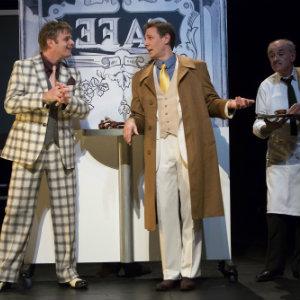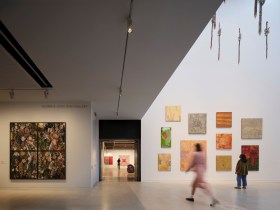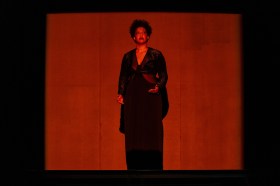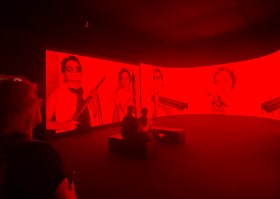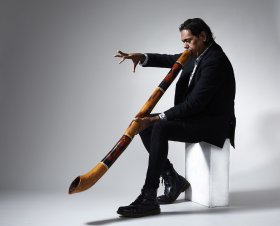First performed in 1662, this much-loved play has been translated, adapted and reimagined many times. This version is all three – translated, but also adapted and reimagined. One cannot help but think, though, that Molière would have heartily approved of the clever work of Justin Fleming, in his first collaboration with Bell Shakespeare.
Molière was influenced both by the bawdiness and slapstick of the Commedia dell’arte and the refined, mannered comedy style of his French predecessors and contemporaries. Fleming’s imaginative translation and the brilliant direction of Lee Lewis have combined to create a masterpiece that offers tribute to both these influences — and to Molière himself — whilst standing firmly on its own feet. Fleming even managed to retain the rhyming couplets in alexandrine metre. That is no small feat in English, which generally lends itself far better to shorter lines. Puns and deliberate anachronisms are noteworthy inclusions. I’m sure M. Molière would not have been familiar with Twitter, but he would have laughed at its inclusion!
Fleming chose to set his version in Paris of the 1920s, with its fast living and daring attitudes. Women were starting to take a far more prominent place in society than they did before WWI, but the customs of the 17th century were still not dead. The premise that a man might become guardian to an innocent young girl and be responsible for her disposition in marriage would still have been believable between the wars in Paris. Having him decide to marry her himself, however, would have been controversial in both eras, as, indeed, it would be today. Funny as The School for Wives is, it is nonetheless social comment as well as comedy. Bell’s publicity sums it up neatly by calling it a ‘train-wreck of a love story that tangles innocence with arrogance – and the other way around’.
I cannot imagine a better cast. John Adam (non-theatregoers will know him from his many television appearances, most recently in City Homicide) had just the right degrees of arrogance, insouciance and self-doubt to make us feel both sympathy for and disapproval of Arnolde, the wealthy guardian of an innocent young woman. His servants, Georgette and Alan (Alexandra Aldrich and Andrew Johnson) mimed, danced, cavorted and romped their way through some physically demanding work that required quick reflexes and fine-tuned timing. Aldrich, a recent NIDA graduate, is a comedienne in the making – certainly a performer to watch! Johnson, a seasoned and versatile performer, provided a great foil for Aldrich with his John Cleese-like interpretation that gave us as many laughs as an episode of Fawlty Towers.
Harriet Dyer, another relative newcomer and also a performer to watch, gave us a wonderful depiction of Agnes, the convent-educated innocent that Arnolde has earmarked for his wife. Like most of the parts in this play, this role was physically demanding, and Dyer stepped up to the mark every time. Her facial expressions were marvellous – open and frank, as would be expected from a naïve young woman who has lived in a convent since she was four.
Agnes’s would-be lover, Horace, was undertaken by Meyne Wyatt (ex WAAPA and NIDA) who brought to the part all the bravado of a young man in love – one who, we suspect, is not quite as street wise and confident as he’d like us to believe. Wyatt, like all the actors, was perfectly in character throughout. He fluffed a few lines, and did it so well that I’m still not sure whether first-night nerves or authenticity of characterisation were responsible. His double ‘thumbs-up’ gesture, adopted and sent up by other characters, was one of the hallmarks of this production. I will never see it again in real life without laughing.
The supporting cast included Damien Richardson, playing the Bertie Wooster-like Chris, Arnolde’s good friend. Richardson is a sound, reliable theatre and TV actor of broad experience, which has not, to date, included any other engagements with Bell Shakespeare. I hope they will make further use of his services. This kind of role is hard to play. Chris serves little purpose other than being a sounding board for Arnold’s backstory and current thoughts, but Richardson made him into an individual. I can imagine him doing Oscar Wilde’s characters very well, too.
Mark Jones was a supporting player in two senses – he played the piano along with a range of percussive devices to create what we’d normally think of as ‘noises off’, but this case were very much ‘noises on’. The sound of a tennis ball bouncing was timed very cleverly and brought a lot of laughs. His sympathetic playing of Kelly Ryall’s specially created score added a great deal to the production. He also doubled in the small role of Lawrence, for which he did one of the fastest quick changes I’ve ever seen!
Jonathan Elsom, in his cameo role as the notary, added a good deal to the comedy, and later appeared as the more serious Henri, to whom he managed to impart a credible character even though it was a small part with few lines.
The production benefited from Marg Horwell’s imaginative and appropriate costumes. They included subtle touches: Agnes, for example, wears three yellow dresses, each one a richer shade than the last. Yellow, they say, is the colour that denotes intellect, and as Agnes gains in sophistication, so do her costumes grow brighter, as did Niklas Pajanti’s admirable lighting, which also served to subtly highlight the development of the story.
I hope the script will be published for study, because I’d love to read it and have some of those laughs all over again, for this is one of the funniest plays I’ve ever seen. I hope it remains in the Bell Shakespeare repertoire.
The Perth Season will almost be over by the time you read this, but if you’re in Melbourne, Canberra or Sydney, you have a treat in store for later in the year.
Rating: 5 stars out of 5
Bell Shakespeare presents
The School for Wives
Director: Lee Lewis
Translator: Justin Fleming
Composer: Kelly Ryall
Designer: Marg Horwell
Lighting: Niklas Pajanti
Movement: Penny Baron
Voice Coach: Anna McCrossin-Owen
Assistant Director: John Kachoyan
State Theatre of WA, Heath Ledger Theatre
July 11 – 14
Additional Dates:
Arts Centre Melbourne, Fairfax Studio: Sept 11 – 22
Canberra Theatre Centre, Playhouse: Sept 25 – Oct 6
Sydney Opera House, Playhouse: Oct 23 – Nov 24

